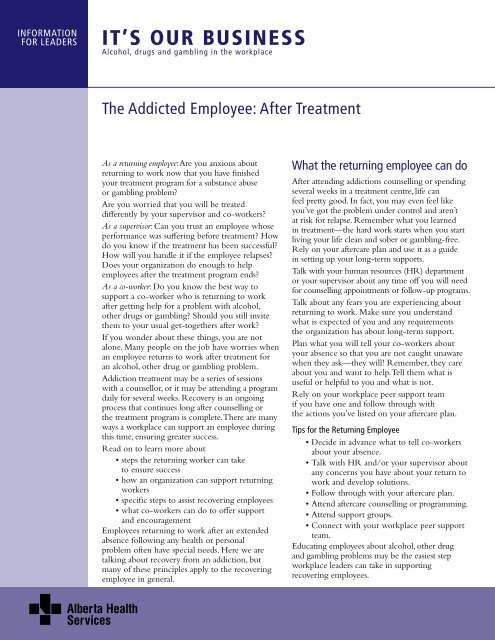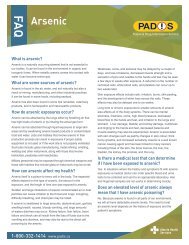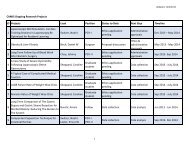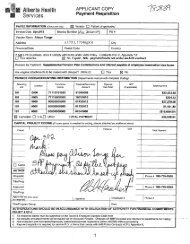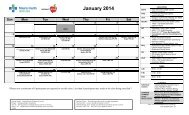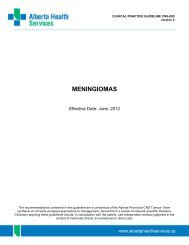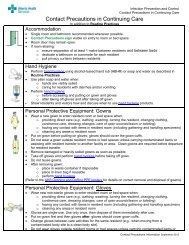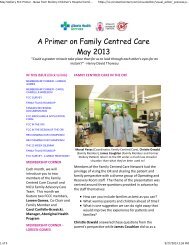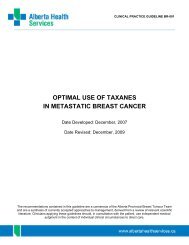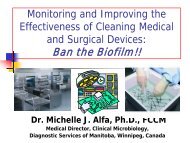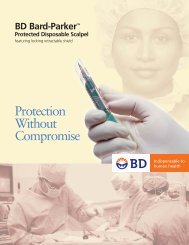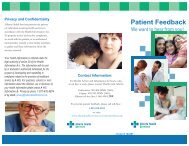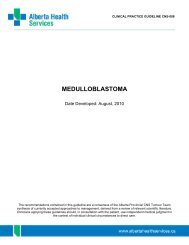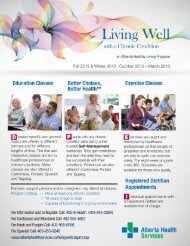The Addicted Employee: After Treatment - Alberta Health Services
The Addicted Employee: After Treatment - Alberta Health Services
The Addicted Employee: After Treatment - Alberta Health Services
You also want an ePaper? Increase the reach of your titles
YUMPU automatically turns print PDFs into web optimized ePapers that Google loves.
information<br />
for leaders<br />
It’s Our Business<br />
Alcohol, drugs and gambling in the workplace<br />
<strong>The</strong> <strong>Addicted</strong> <strong>Employee</strong>: <strong>After</strong> <strong>Treatment</strong><br />
As a returning employee: Are you anxious about<br />
returning to work now that you have finished<br />
your treatment program for a substance abuse<br />
or gambling problem?<br />
Are you worried that you will be treated<br />
differently by your supervisor and co-workers?<br />
As a supervisor: Can you trust an employee whose<br />
performance was suffering before treatment? How<br />
do you know if the treatment has been successful?<br />
How will you handle it if the employee relapses?<br />
Does your organization do enough to help<br />
employees after the treatment program ends?<br />
As a co-worker: Do you know the best way to<br />
support a co-worker who is returning to work<br />
after getting help for a problem with alcohol,<br />
other drugs or gambling? Should you still invite<br />
them to your usual get-togethers after work?<br />
If you wonder about these things, you are not<br />
alone. Many people on the job have worries when<br />
an employee returns to work after treatment for<br />
an alcohol, other drug or gambling problem.<br />
Addiction treatment may be a series of sessions<br />
with a counsellor, or it may be attending a program<br />
daily for several weeks. Recovery is an ongoing<br />
process that continues long after counselling or<br />
the treatment program is complete. <strong>The</strong>re are many<br />
ways a workplace can support an employee during<br />
this time, ensuring greater success.<br />
Read on to learn more about<br />
• steps the returning worker can take<br />
to ensure success<br />
• how an organization can support returning<br />
workers<br />
• specific steps to assist recovering employees<br />
• what co-workers can do to offer support<br />
and encouragement<br />
<strong>Employee</strong>s returning to work after an extended<br />
absence following any health or personal<br />
problem often have special needs. Here we are<br />
talking about recovery from an addiction, but<br />
many of these principles apply to the recovering<br />
employee in general.<br />
What the returning employee can do<br />
<strong>After</strong> attending addictions counselling or spending<br />
several weeks in a treatment centre, life can<br />
feel pretty good. In fact, you may even feel like<br />
you’ve got the problem under control and aren’t<br />
at risk for relapse. Remember what you learned<br />
in treatment—the hard work starts when you start<br />
living your life clean and sober or gambling-free.<br />
Rely on your aftercare plan and use it as a guide<br />
in setting up your long-term supports.<br />
Talk with your human resources (HR) department<br />
or your supervisor about any time off you will need<br />
for counselling appointments or follow-up programs.<br />
Talk about any fears you are experiencing about<br />
returning to work. Make sure you understand<br />
what is expected of you and any requirements<br />
the organization has about long-term support.<br />
Plan what you will tell your co-workers about<br />
your absence so that you are not caught unaware<br />
when they ask—they will! Remember, they care<br />
about you and want to help. Tell them what is<br />
useful or helpful to you and what is not.<br />
Rely on your workplace peer support team<br />
if you have one and follow through with<br />
the actions you’ve listed on your aftercare plan.<br />
Tips for the Returning <strong>Employee</strong><br />
• Decide in advance what to tell co-workers<br />
about your absence.<br />
• Talk with HR and/or your supervisor about<br />
any concerns you have about your return to<br />
work and develop solutions.<br />
• Follow through with your aftercare plan.<br />
• Attend aftercare counselling or programming.<br />
• Attend support groups.<br />
• Connect with your workplace peer support<br />
team.<br />
Educating employees about alcohol, other drug<br />
and gambling problems may be the easiest step<br />
workplace leaders can take in supporting<br />
recovering employees.
information for leaders | the addiction employee: after treatment<br />
What the workplace can do<br />
Policies and programs<br />
It is very important for workplaces to develop clear policies<br />
that encourage early intervention with troubled employees.<br />
Some organizations will achieve this by developing an alcohol<br />
and drug policy, others will call it a “fitness-for-work”<br />
policy. Either way, the policy will outline ways for employees<br />
to get help and steps to support them through treatment and<br />
long-term recovery. Some policies also outline whether or<br />
not alcohol may be served at company functions. If alcohol<br />
is served, the policies make provision for safe and responsible<br />
use as well as taking the needs of non-drinking and recovering<br />
employees into account.<br />
Larger workplaces may also have employee and family<br />
assistance programs (EFAPs) to assist employees experiencing<br />
personal problems that may or may not be affecting<br />
their work performance. Small companies may not have<br />
an EFAP but they can still assist employees by maintaining<br />
a current listing of local resources available in the community.<br />
Education<br />
Studies indicate that employees returning from treatment<br />
find it difficult when their supervisors and co-workers<br />
are not knowledgeable about addiction. <strong>The</strong> process of an<br />
employee returning to work is much smoother and more<br />
successful when all staff are knowledgeable about addiction<br />
and recovery.<br />
Education may be the easiest step a workplace can take in<br />
supporting recovering employees. Co-workers who are<br />
knowledgeable about alcohol, other drug and gambling<br />
problems will understand that, for the addict, total abstinence<br />
becomes a lifelong goal. <strong>The</strong>y will also understand that recovery<br />
is a process that requires ongoing efforts to maintain<br />
change. That is why people who have chosen to quit forever<br />
are called “recovering.”<br />
Education about relapse is also important. Many people<br />
recovering from alcohol, other drug and gambling problems<br />
will relapse at least once. A relapse is not necessarily a sign<br />
of failure. A relapse can offer the person an opportunity<br />
to fine-tune a part of their ongoing recovery program<br />
that is not working well.<br />
Workplace peer support teams<br />
Many workplaces recognize the value of peers helping<br />
peers and set up peer support teams. When people have<br />
personal problems, they often talk to their friends first.<br />
Co-workers can be very helpful in encouraging employees<br />
with personal problems to seek help.<br />
This is especially true if they have been trained and are<br />
familiar with the kinds of supports and resources available to<br />
help. Peer support team members also know the difference<br />
between offering support and encouragement and the need<br />
for professional help.<br />
Peer support teams can be an excellent support for recovering<br />
employees. Team members may have experienced<br />
personal problems themselves and can offer an understanding<br />
ear as well as their personal recovery successes. Most<br />
importantly, peer support team members are available on<br />
site, offering a ready source of confidential help and<br />
encouragement.<br />
Workplace support groups<br />
Larger workplaces will sometimes host 12-step support<br />
group meetings on site. Twelve-step support groups are independent,<br />
worldwide fellowships of men and women who<br />
meet with the sole purpose of helping one another get<br />
or stay clean and sober or gambling-free. Some examples<br />
of 12-step groups are Alcoholics Anonymous, Narcotics<br />
Anonymous and Gamblers Anonymous. A workplace hosts<br />
these self-help group meetings by offering them a place<br />
in which to meet. <strong>The</strong> group runs itself.<br />
Tips for the workplace<br />
• Develop and follow clear policies that encourage<br />
early recognition of troubled employees and that<br />
support them through treatment and long-term<br />
recovery.<br />
• Offer services that assist troubled employees through<br />
an employee assistance program and/or identify<br />
resources available in your community.<br />
• Develop education programs about alcohol, other<br />
drugs and gambling for all staff.<br />
• Develop, train and participate in peer support teams.<br />
• Make group support for recovering workers available<br />
at your worksite.<br />
• Recognize the needs of recovering employees when<br />
planning social events.<br />
What workplace leaders can do<br />
Following are some specific steps that HR and/or<br />
the supervisor can take to ensure recovering employees<br />
a smooth transition back to work.<br />
Return-to-work meetings<br />
It can be very useful for the organization to have a meeting<br />
with the returning employee prior to the date the employee<br />
actually returns to work. Depending upon the size of the<br />
workplace, the employee may meet with a human resources<br />
professional, a health care provider, the supervisor or some<br />
combination of these individuals. Often the recovering<br />
worker is wondering about confidentiality—who knows<br />
why I have been away and what have they been told?<br />
Sometimes they fear that others will treat them differently<br />
or avoid them altogether. <strong>The</strong>y may even be unsure about<br />
the company’s expectations about job performance or<br />
follow-up requirements.
information for leaders | the addiction employee: after treatment<br />
Workplace leaders are often concerned about how to best<br />
support the returning worker. <strong>The</strong>re may also be concerns<br />
about the worker’s ability to maintain an acceptable level of<br />
job performance. A return-to-work meeting can offer both<br />
parties an opportunity to talk about their concerns and<br />
identify solutions.<br />
<strong>The</strong> return-to-work meeting may be used to<br />
• update the employee about any changes that have<br />
happened during his or her absence<br />
• remind the employee that he or she has been missed<br />
and is valued by the organization<br />
• discuss and deal with any fears or concerns the employee<br />
has about returning to work<br />
• identify any special needs the employee may have<br />
returning to work<br />
Return-to-work agreements<br />
HR representatives and/or supervisors must also be clear<br />
about job performance expectations and what will happen<br />
if job performance is not satisfactory.<br />
Relapse can be very serious in terms of safety, liability,<br />
workplace morale and customer image. <strong>The</strong>re must be a<br />
balance between supporting a recovering employee and<br />
ensuring workplace safety. <strong>The</strong> consequences of a relapse<br />
must be spelled out very clearly. Even though it may never<br />
happen, it is important for HR and/or supervisors and<br />
employees to talk openly about the possibility and<br />
consequences of a relapse.<br />
A return-to-work agreement is a formal, written record<br />
of the agreements made between the organization and<br />
the employee. It should specify<br />
• clear performance expectations<br />
• when and how performance will be reviewed<br />
• consequences of poor performance<br />
• consequences of a relapse (e.g., being under<br />
the influence of alcohol on the job, testing positive<br />
for drugs, gambling on company time)<br />
• the plan for long-term support<br />
Long-term support<br />
<strong>The</strong>re needs to be ongoing supervision and support<br />
once the employee is back on the job. Meeting with<br />
the employee on a regular basis to review job performance<br />
provides opportunity for the supervisor to recognize,<br />
compliment and support employees who are succeeding.<br />
It also provides an opportunity to address any job performance<br />
concerns early, before major problems develop.<br />
<strong>The</strong> recovering employee should leave their treatment<br />
program with an aftercare plan. This plan includes steps<br />
the employee can take to reduce the risk of relapse.<br />
This plan may require ongoing counselling or attendance<br />
at self-help group meetings. Some flexibility with scheduled<br />
work hours may be necessary for a period of time after<br />
the employee returns to work.<br />
Tips for HR and/or the supervisor<br />
• Set up a return-to-work meeting for returning<br />
employees.<br />
• Provide returning employees with written job<br />
performance guidelines, including consequences<br />
if performance expectations are not met.<br />
• Consider completing a return-to-work agreement.<br />
• Ensure all employees are aware of sources of assistance<br />
and support.<br />
• Adjust the employee’s work schedule to accommodate<br />
time off to attend follow-up counselling and<br />
programming.<br />
• Review performance regularly.<br />
• Maintain confidentiality.<br />
• Compliment and reinforce the employee’s success.<br />
What co-workers can do<br />
It’s important to look at what is helpful and what is not<br />
when it comes to supporting your fellow workers. Sometimes<br />
co-workers think they are helping a person with a<br />
problem by covering up for them or ignoring the problem<br />
altogether. <strong>The</strong>se actions don’t help. In fact, they sometimes<br />
make the problem worse by allowing it to continue longer.<br />
This is true even after a co-worker gets help for a problem.<br />
A good rule of thumb is to ask yourself “if one of my coworkers<br />
who didn’t have a problem was doing this, would<br />
I ignore it or try to make excuses?” If the answer is “no,”<br />
then you shouldn’t do it for the recovering person either.<br />
It is also important not to get caught up in trying to make<br />
things easier for returning workers. For example, doing<br />
their work or speaking to others on their behalf actually<br />
robs them of the opportunity to be responsible for their<br />
own success. People recovering from addiction problems<br />
learn they must take responsibility for their own actions.<br />
This means they need to carry their own workload and<br />
make their own decisions.<br />
So, it’s okay to ask a recovering colleague to join you at<br />
the weekend golf tournament, even if you know alcohol<br />
is being served. Be prepared for your co-worker to decline<br />
and, if they do, don’t insist or pressure them into activities<br />
they are uncomfortable with.<br />
Do support their decisions and continue to include them<br />
in activities.<br />
Tips for co-workers<br />
• Participate in education sessions to learn about<br />
problems that can affect you or your fellow<br />
employees.<br />
• Offer support and encouragement, but don’t try<br />
to counsel.
information for leaders | the addiction employee: after treatment<br />
• Remind troubled or recovering co-workers about<br />
the help available either at your workplace or in your<br />
community.<br />
• Do not cover up or ignore your co-workers’ poor job<br />
performance.<br />
• Consider joining a peer support team.<br />
For more information<br />
<strong>Alberta</strong> <strong>Health</strong> <strong>Services</strong> offers a range of services to assist<br />
businesses in managing workplace substance use and<br />
gambling concerns. For more information and to find<br />
an addiction services office near you, please call<br />
the 24-hour Helpline at 1-866-332-2322.<br />
© AHS 2010 isBN 0-7785-0110-8<br />
414G


